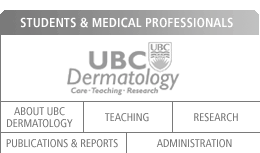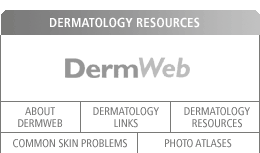|

At this time psoriasis cannot be cured but can be helped and improved with treatment. You may have had psoriasis for a long time and know a great deal about it, or you may have just found out that you have this condition. It is important that you know all you can about psoriasis so that you can better understand the treatments and how to get the best possible results.
What is psoriasis?
- Psoriasis is a chronic scaling disease of the skin. It may range from just a few spots anywhere on the body to much larger areas.
- It is not contagious and will not spread from one part of the body to another or from one person to another.
- There is no blood test for psoriasis. The diagnosis is made by observation and examination of the skin. Sometimes microscopic examination of the skin (biopsy) is helpful where the changes are not typical or characteristic.
- The exact cause of psoriasis is unknown, but hereditary and genetic factors are important. Psoriasis runs in families. This does not mean, however, that every child of a parent with psoriasis will develop psoriasis, but it is common that somewhere down the line, psoriasis will appear in families.
- Allergies, infections, dietary deficiencies or excesses, or nervous tension do not cause psoriasis.
How serious is psoriasis?
- Psoriasis does not affect overall general health.
- If it is widespread, it can certainly cause a great deal of skin discomfort and emotional embarrassment, and can affect job and leisure time activities.
- Fortunately, most people who have psoriasis only have a small amount and while it certainly can be a nuisance, it does not alter their lifestyle.
- In about 10 percent of psoriasis cases, people can develop a form of arthritis called psoriatic arthritis. It will take proper medical examination to confirm this diagnosis. Although not always, psoriatic arthritis is more often seen in people with widespread psoriasis than those with lesser forms of it. Psoriatic arthritis can affect people of all ages.
Is there a cure for psoriasis?
- There is no present cure for psoriasis, but a number of drugs and treatments can relieve and control it, often for long periods of time.
- Psoriasis on its own can come and go often with long periods of remission. In most cases, however, psoriasis is persistent, and does not necessarily become worse with age.
- Psoriasis can occur at any age from infancy to the elderly.
- It can also come and go without any obvious reason. Psoriasis will often remain in small, localized areas and never spread.
How is psoriasis treated?
- Treatment is determined by the location, severity and history of psoriasis in each individual. There is no one way of treatment, for each person with psoriasis may respond differently.
- Rapid growth rate of skin cells causes the red, scaly psoriasis patches. One main objective of treatment is to slow down this faster-than-usual growth rate. The underlying cause of this increased skin growth is not yet known.
| - |
For patients with minimal psoriasis, therapy is limited to topical medications that are drugs applied to the skin. For patients with moderate to widespread psoriasis, topical treatments are often combined with ultraviolet light therapy. Either sunlight or artificial ultraviolet light therapy can be used. |
| - |
If topical and ultraviolet light therapy are not effective, or are not practical, systemic or oral medications can be used. The combination of oral medications with ultraviolet light therapy is called photochemotherapy or PUVA therapy. |
| - |
In severe and unresponsive cases of psoriasis, there are oral medications that can be helpful that slow down the growth rate of skin. However, these drugs can have significant side effects and must be used with the proper safeguards and caution. Even these strong drugs do not cure psoriasis but only help to control the disease. |
What topical drugs are available?
1. Corticosteroids
- Many dermatologists prefer cortisone creams or ointments for the initial treatment. They are easy to use and are probably the best form of therapy for such areas as the scalp, face, ears and skin folds. Misuse of topical cortisone creams, such as using strong creams on the skin for too often and too long, can lead to changes in skin colour, thinning of the skin, and easy bruising. The face and skin folds are special danger areas. Often, if only cortisone creams are used for treatment, the psoriasis will become resistant and will flare quickly if the creams are stopped.
2. Tars
- It is known that the application of tars to the skin can improve psoriasis. The problem is that many tars are messy and smelly to use. The purified tars in creams and ointments or gels are much easier and more pleasant to use. Tar seems to increase the effectiveness of ultraviolet light. The tars can also be used in solutions for bathing.
3. Anthralin
- This is an old remedy for psoriasis but is probably the most effective of all topical treatments. The disadvantage of anthralin is that it is messy, stains clothing and the skin. However, if directions for its use are followed, these side effects can be minimized.
- The application of certain strengths of anthralin in creams and ointments to the skin for only short periods of time, 10 to 20 minutes, can be very effective and can reduce the problems of staining of clothing and the skin.
- Often a combination of a variety of topical drugs is used if the psoriasis does not respond to one treatment or the other. We frequently find that we need to change from one treatment to another to ensure constant improvement.
4. Ultraviolet Light
- As mentioned, sunlight is helpful in a majority of patients. Because of our weather pattern, we cannot rely on sunlight for much of the year.
- Artificial ultraviolet light is very helpful. The most useful ultraviolet light is UVB, or short-wave ultraviolet light. This is not the same light that is used in suntan parlors. Exposure to properly controlled UVB light along with topical drugs can affect good clearing and maintenance of psoriasis.
- For resistant psoriasis, long-wave ultraviolet light, or UVA, is used in combination with certain oral medications.
5. Vitamin D and A derivatives.
- Modified versions of vitamins D (calcipotriol) and A (tazarotene) are now available for treating psoriasis. Unlike tars and anthralin, these creams, gels and ointments are not messy or smelly, although they can cause irritation in some cases. They are often used in combination with topical corticosteroids.
What systemic drugs are available?
- Patients with more extensive psoriasis that does not respond to topical preparations may need more intensive treatment. None of these treatments, however, produces a permanent cure of psoriasis.
- All oral or systemic medications for psoriasis are associated with a greater risk of serious side effects and should therefore be used in exceptional cases.
- A new class of drugs called Immunobiologics is available, and these drugs affect the lymphocytes called T-Cells which are known to play an active part in psoriasis. These drugs can target different steps in the pathway of producing psoriasis, such as blocking T-cell activation and blocking the migration of T-cells into the skin.
- You are best to consult with your dermatologist if you wish to be considered for these treatments.
What does this all mean?
- Psoriasis can vary from a nuisance problem to a life-altering condition.
- You should know as much as you can about psoriasis, its aggravators and its treatments.
- The object of treatment is to improve your psoriasis to the greatest degree possible so it is physically and socially acceptable to you.
You can learn more about psoriasis at:
The National Psoriasis Foundation
To schedule a consultation please call us at 604-875-5151
|

